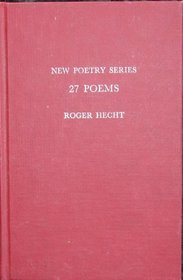Poet: Carol Berge
Book: "An American Romance" Copyright 1969
ISBN: PS 3552. E716. A8 c.2
Available at NMSU's Zuhl Library
There's little that's axiomatic about her work--no stark epigrams in the service of some omniscient (or at least uber-cognizant) speaker. Instead the voice flows naturally from a weaving of the daily profundity of being with somebody so that Berge achieves an earnestness, aware only of its own baggage and the implications of the "Romance" in question. Readers of "An American Romance" will find that its poems rarely revel in scenery; rather, the positioning of the poem's tension concerns a limbic area between the speaker and the romantic other with whom she wishes to connect. Because of this, the language of the poetry often evokes an aural intimacy--perhaps by dint of its tandem of opacity/closeness.
Participating with Berge's speakers here is like hearing a loved one talking to you or someone of concern through a wall. And there's definitely an arc to the dialogue the reader overhears, with love poems beginning in a jovial, almost naively warm place that is gradually shaded over by complication; and as hackneyed as this arc may seem in terms of depicting romance, Berge pulls it off. I recommend this collection for its craft and refreshing warmth. And as mentioned earlier its earnest voice salts it with a lack of pretension. Check it out.
Here's a short sample:
The Loving
Turning it aside with your hand,
saying: you do not like
those things that tremble.
But it is the softer beasts
who, walking through your life
perhaps furred or
glistening like humans,
having given you sustenance...
The loving
is contained firmly in you,
in the beautiful
bones of muscles of you,
cupping the gentleness
holding it safe...
You go to some private room
to tremble; to give love...
Friday, June 29, 2012
Saturday, June 2, 2012
Pondside: 27 Poems
 Book: 27 Poems (1966)
Book: 27 Poems (1966)The Swallow Press, Chicago
Author: Roger Hecht
ISBN: PS 3558. E3. T9 1966
Available for Checkout at the Zuhl Library at NMSU
Speaking of svelte, although not quite as trim as Piero Heliczer's aforementioned staple-bounder, Roger Hecht's 27 Poems delivers its goods with the spine girth of a Vincent Price mustache. But hey, big things small packages, yada yada yada. Seriously though, Hecht's 1966 debut collection is worth a look.
Poems often feature egos meeting a riptide of concern involved with positioning one's self in relation to other forces, whether those be natural or societal. Hecht sanctifies the former creating a familiar Romantic binary, but his speakers never quite hug the sublime. Like Timothy Donnelly's Explanation of an Oriole, nature is often a visiting salve that lights on the speaker and then flies away, not a purifying alembic for consciousness. Then again, there are poems within the collection that might contradict this interpretation, like "Summer's End" for instance. So, grain of salt. However, it's hard to disagree with Hecht's preoccupation with circumscribing the external forces that harry the individual; many poems like the long narrative "The Last Crusade" feature the speaker engaging other psychologies beset by the same problem. In "The Last Crusade" the speaker throws in with Woodrow Wilson, speculating on how he dealt with his position as President and as arbiter of the U.N.'s formation. There are a few telling lines to that end in the poem on page 57:
"Everything is persistently impersonal. I am administering
a great office, but I do not seem to be identified with it:
it is not me and I am not it. This impersonality of my
life is a very old thing, and perhaps robs it of intensity
Overall, Hecht's 27 Poems is a nice (and quick) read. However, if you're looking for anything experimental or out of the ordinary, I wouldn't suggest it. The collection's very tame, in many ways, old fashioned even. My friend and fellow poet, Jennifer Eldridge, who's always concerned with trashing adjectival modification should stay away from this one. But if you're itching for something that sounds great when read aloud, Hecht's work might be for you I'm interested in the way Hecht uses the word "boredom" in the collection--shades of Baudelaire or Dostoevsky, maybe. But I wasn't able to tie any kind of knot between them.
-Paul French
Subscribe to:
Comments (Atom)